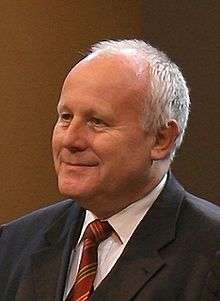Georg Milbradt
Georg Milbradt (born 23 February 1945) is a German politician (CDU) who was the 2nd Minister President of Saxony from 2002 to 2008.
Georg Milbradt | |
|---|---|
 | |
| Minister President of Saxony | |
| In office 18 April 2002 – 27 May 2008 | |
| Preceded by | Kurt Biedenkopf |
| Succeeded by | Stanislaw Tillich |
| Personal details | |
| Born | 23 February 1945 Eslohe |
| Citizenship | German |
| Alma mater | University of Münster |
Life
Milbradt was born in Eslohe. His family originally was from Wągrowiec (Wongrowitz) near Poznań (Posen) but ended up in Dortmund after World War II, and he passed his Abitur there in 1964. From 1964 to 1968, Milbradt studied economics, law, and mathematics at the University of Münster. He graduated with a degree in economics in 1968. From 1970 to 1980, he was scientific assistant at the institute for finance at the University of Münster, where he obtained his doctoral degree (Dr. rer. pol., summa cum laude) in 1973 and his habilitation in 1980. From 1980 to 1983, Milbradt worked as substitute professor of finance and political economics at the University of Mainz; since 1985 he holds the title of an (unsalaried) professor at the economics faculty in Münster.
Political career
Milbradt has been a member of the CDU since 1973. He was head of the finance department of the city of Münster from 1983 to 1990 and then Minister of Finance of Saxony from 1990 to January 2001, but was dismissed from office by Minister-President Kurt Biedenkopf because Milbradt had started a debate about Biedenkopf's succession. Milbradt served as member of the state board of the CDU from 1991 and became deputy chairman of the state CDU in 1999 and chairman in 2001. From 1994 until 2009, he was a member of the Landtag of the Free State of Saxony.
On 18 April 2002, Milbradt was elected as Minister-President of Saxony despite Biedenkopf's explicit opposition. Milbradt first governed with an absolute CDU majority, but in a coalition with the SPD after the state elections of 19 September 2004, in which the CDU lost a large number of votes.
In April 2008 Milbradt announced that he would resign from the office by the end of May and that Stanislaw Tillich would succeed him. He had been under pressure for months because of his involvement in the liquidity crisis of the government's Sachsen LB bank. Milbradt has also been criticized for private loans from the bank during his time as Minister of Finance in Saxony; in April 2008, the state government confirmed that Milbradt and his wife had borrowed a total of around €172,000 ($272,000) between 1996 and 1999 to help purchase around €360,000 in investment fund products from a subsidiary of the bank.[1]
Life after politics
In 2010, Milbradt and former Mayor of Hannover Herbert Schmalstieg served as arbitrators to mediate in a wage dispute between the German United Services Trade Union (ver.di) and the country’s public sector employers.[2] He later successfully mediated in a similar conflict between train operator ODEG and the German Train Drivers' Union (GDL) in 2011.[3] In 2015, the Association of Local Government Employers (VKA) appointed Milbradt as its negotiator in a dispute with employees of day nurseries in Germany; again, Schmalstieg served as his counterpart in the talks.[4]
As a delegate of the Catholic Church in Germany, Milbradt was one of the members of the country’s temporary National Commission on the Disposal of Radioactive Waste from 2014 and 2016.[5] From 2015 until 2016, he served on a government-appointed commission tasked with recommending how to safeguard the funding of fulfilling Germany's exit from nuclear energy, under the leadership of co-chairs Ole von Beust, Matthias Platzeck and Jürgen Trittin.[6][7] He was a CDU delegate to the Federal Convention for the purpose of electing the President of Germany in 2017.[8]
Since 2017, Milbradt has been serving as the German government’s special envoy for the Ukrainian reform agenda.[9]
Other activities
- HHL Foundation, Chairman of the Board[10]
- Max Planck Institute for the Physics of Complex Systems, Member of the Board of Trustees
- Forum of Federations, Member of the Board (2010-2013), Chairman of the Board (from 2013)
- Deutsche Bank, Member of the Advisory Board (2004-2006)[11][12]
Milbradt oversees the Schüler Helfen Leben initiative.
Recognition
Personal life
Milbradt is married to Angelika Meeth-Milbradt, a professor of economics, since 1975. They have two children.
Works
- Die demographische Herausforderung. Sachsens Zukunft gestalten, by Georg Milbradt and Johannes Meier, Bertelsmann Stiftung, 2004, ISBN 3-89204-793-6
- Kraft der Visionen, by Georg Milbradt and Thomas Rietzschel, Kiepenheuer, 2003, ISBN 3-378-01065-7
References
- Political Fallout: Banking Crisis Topples Governor of Saxony Spiegel Online, April 14, 2008.
- Alfons Frese (February 26, 2010), Tarifkonflikt: Westfälischer Frieden Tagesspiegel.
- Schlichtung im Tarifkonflikt bei Odeg erfolgreich Berliner Morgenpost, November 20, 2011.
- Udo Harms (June 23, 2015), Kein Grund zum Jubeln für Verdi Hannoversche Allgemeine Zeitung.
- Abschlussbericht der Kommission Lagerung hoch radioaktiver Abfallstoffe
- Birgit Marschall (15 October 2015), Trittin, Platzeck und Beust leiten Atom-Kommission Rheinische Post.
- John O'Donnell and Christoph Steitz (29 November 2015), Minister signals German trust could handle nuclear waste storage Reuters.
- Sächsischer Landtag hat 34 Mitglieder der 16. Bundesversammlung gewählt Landtag of the Free State of Saxony, press release of 13 December 2016.
- Chritian F. Trippe (August 19, 2017), Special Envoy Georg Milbradt: Ukraine has achieved major success Deutsche Welle.
- About Us HHL Foundation.
- Members of the Advisory Board, 2004 Deutsche Bank.
- Members of the Advisory Board, 2006 Deutsche Bank.
- Mühlbradt, Max: Das Geschlecht Milbradt (Milbrandt, Mildebrath, Milbrath, Milbrod, Mühlbrecht, Mühlbradt). Nachfahrentafeln. Landsberg an der Warthe: Selbstverlag des Verfassers 1934.
- Ulrich Brümmer: Parteien und Wahlen in Sachsen, Wiesbaden 2006, ISBN 3-531-14835-4
External links
- Georg Milbradt in the German National Library catalogue
- Official homepage
